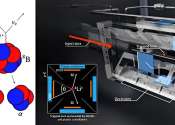Collaboration identifies rare nuclear decay in long-lived potassium isotope
Some nuclei of certain elements decay radioactively into nuclei of different elements. These decays can be useful or annoying depending on the context. This is especially true for potassium-40. This isotope usually decays ...









